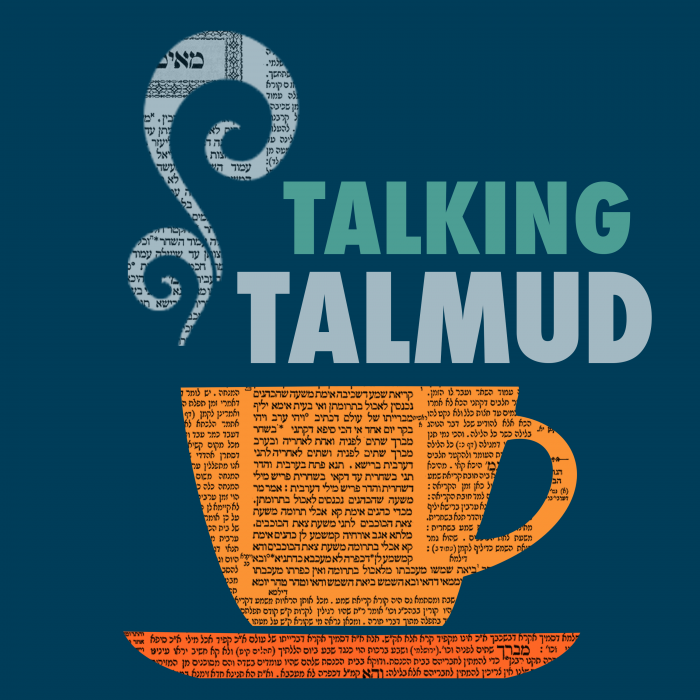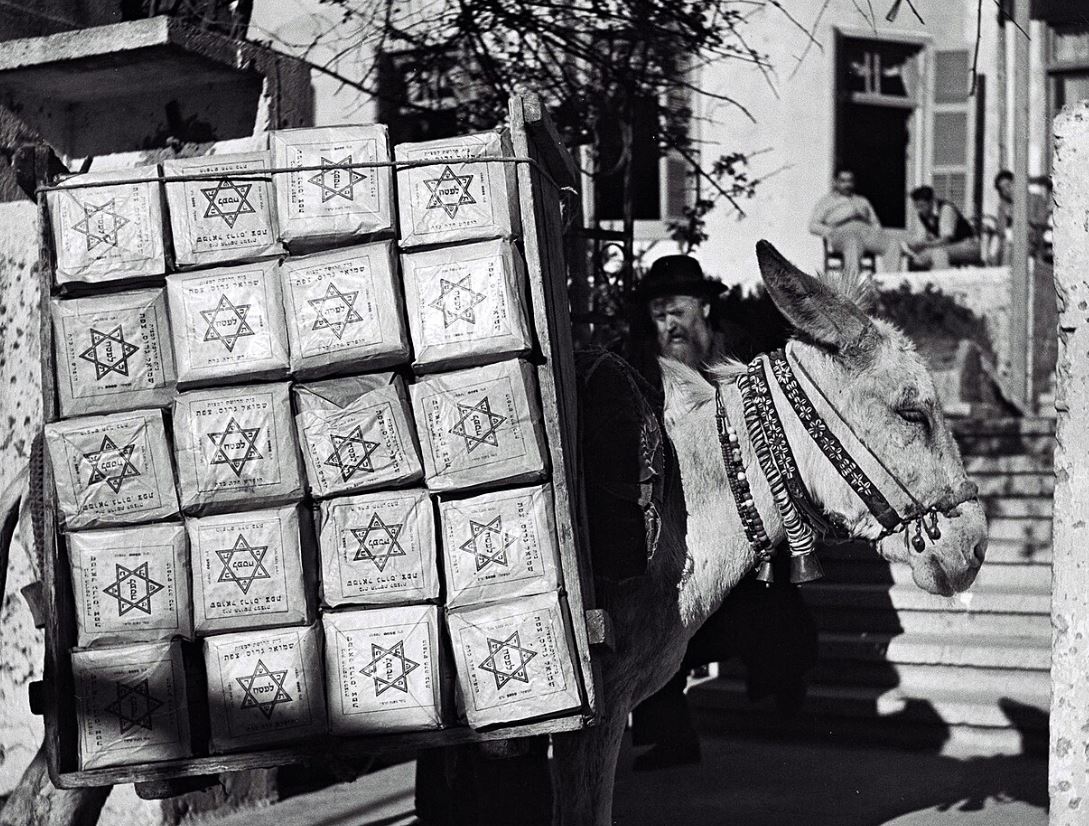Bava Batra 77
אָמַר אַמֵּימָר, הִלְכְתָא: אוֹתִיּוֹת נִקְנוֹת בִּמְסִירָה, כְּרַבִּי. אָמַר לֵיהּ רַב אָשֵׁי לְאַמֵּימָר: גְּמָרָא, אוֹ סְבָרָא? אָמַר לֵיהּ: גְּמָרָא. אָמַר רַב אָשֵׁי: סְבָרָא נָמֵי הוּא – דְּאוֹתִיּוֹת מִילֵּי נִינְהוּ, וּמִילֵּי בְּמִילֵּי לָא מִיקַּנְיָן.
Ameimar says: The halakha is that letters are acquired by merely transferring the document to the buyer, in accordance with the opinion of Rabbi Yehuda HaNasi. Rav Ashi said to Ameimar: Is your ruling based on a tradition or on your own logical reasoning? Ameimar said to him: It is based on a tradition. Rav Ashi said: It also stands to reason that the contents of a promissory note are acquired through transferring, as letters, i.e., the contents of a promissory note, are words, i.e., the buyer is acquiring the right to a monetary obligation, not a physical item, and words cannot be acquired through other words.
וְלָא?! וְהָאָמַר רַבָּה בַּר יִצְחָק אָמַר רַב: שְׁנֵי שְׁטָרוֹת הֵם – ״זְכוּ בְּשָׂדֶה לִפְלוֹנִי וְכִתְבוּ לוֹ אֶת הַשְּׁטָר״ – חוֹזֵר בַּשְּׁטָר, וְאֵינוֹ חוֹזֵר בַּשָּׂדֶה.
The Gemara asks: And is it true that documents cannot be acquired through words? But doesn’t Rabba bar Yitzḥak say that Rav says: There are two types of documents. The first type is where one says to others: Take possession of this field for so-and-so and write the document for him as proof of the sale of the field. In this case, he may renege with regard to the document, i.e., he may change his mind and tell them not to write it. But he may not renege with regard to the field, as the buyer has already acquired it.
״עַל מְנָת שֶׁתִּכְתְּבוּ לוֹ אֶת הַשְּׁטָר״ – חוֹזֵר בֵּין בַּשְּׁטָר בֵּין בַּשָּׂדֶה.
The second type of document is where he said: Take possession of this field for so-and-so on the condition that you write him a document. If the document has not yet been delivered he can retract his instruction both with regard to the document and with regard to the field, as the transfer of the field is dependent on the writing of the document.
וְרַב חִיָּיא בַּר אָבִין אָמַר רַב הוּנָא: שְׁלֹשָׁה שְׁטָרוֹת הֵן; תְּרֵי – הָא דַּאֲמַרַן, אִידַּךְ – אִם קָדַם מוֹכֵר וְכָתַב אֶת הַשְּׁטָר.
And Rav Ḥiyya bar Avin says that Rav Huna says: There are actually three types of documents. Two are those that we stated above, and the other is if the seller wrote the document in advance.
כְּאוֹתָהּ שֶׁשָּׁנִינוּ: כּוֹתְבִין שְׁטָר לַמּוֹכֵר אַף עַל פִּי שֶׁאֵין לוֹקֵחַ עִמּוֹ. כֵּיוָן שֶׁהֶחְזִיק זֶה בַּקַּרְקַע – נִקְנָה שְׁטָר בְּכׇל מָקוֹם שֶׁהוּא; וְזוֹ הִיא שֶׁשָּׁנִינוּ: נְכָסִים שֶׁאֵין לָהֶן אַחְרָיוּת נִקְנִין עִם נְכָסִים שֶׁיֵּשׁ לָהֶן אַחְרָיוּת, בְּכֶסֶף וּשְׁטָר וַחֲזָקָה!
This is like that which we learned in a mishna (167b): A scribe may write a bill of sale for the seller even if the buyer is not with him when the seller presents his request. In a case of this kind, once this buyer takes possession of the land the deed is acquired wherever it is. And this is that which we learned in another mishna (Kiddushin 26a): Property that does not serve as a guarantee, i.e., movable property, can be acquired together with property that serves as a guarantee, i.e., land, when the land is acquired by means of giving money, or by means of giving a document, or by means of taking possession. This shows that a bill of sale can be transferred without any act of acquisition performed for the document, and certainly through words, which presents a difficulty to Rav Ashi’s opinion.
אַגַּב שָׁאנֵי; דְּהָא מַטְבֵּעַ – דְּלָא נִיקְנֵי בַּחֲלִיפִין, וְאַגַּב אַרְעָא נִיקְנֵי.
The Gemara answers: Acquiring a bill of sale by means of acquisition of land is different, as it is similar to acquisition through an item, not by means of words. The reason is that money, which cannot be acquired through symbolic exchange, a pro forma act of acquisition effecting the transfer of ownership of an item, nevertheless can be acquired by means of land.
כִּי הָא דְּרַב פָּפָּא הֲווֹ לֵיהּ תְּרֵיסַר אַלְפֵי זוּזֵי בֵּי חוֹזָאֵי, אַקְנִינְהוּ נִיהֲלֵיהּ לְרַב שְׁמוּאֵל בַּר אַחָא אַגַּב אַסִּיפָּא דְבֵיתֵיהּ. כִּי אֲתָא, נְפַק לְאַפֵּיהּ עַד תְּווֹךְ.
This is like that incident where Rav Pappa had deposited twelve thousand dinars with bailees in Bei Ḥozai. He transferred ownership of the money in Bei Ḥozai to his agent Rav Shmuel bar Aḥa by means of the threshold of his house. The Gemara adds: When Rav Shmuel bar Aḥa came from Bei Ḥozai with the money, Rav Pappa was so happy that he was bringing him his money that he went out all the way until Tavakh to greet him.
אֲבָל לֹא מָכַר לֹא אֶת הָעֲבָדִים וְלֹא אֶת הַמַּרְצוּפִין וְלֹא אֶת הָאַנְתִיקֵי וְכוּ׳. מַאי ״אַנְתִיקֵי״? אָמַר רַב פָּפָּא: עִיסְקָא דִּבְגַוַּוהּ.
§ The mishna teaches that when one sells a ship he has sold various other items; but he has not sold the slaves, nor the packing bags, nor the antikei. But when one said to the buyer: You are purchasing the ship and all that it contains, all of these are sold as well. The Gemara asks: What is the meaning of antikei? Rav Pappa said: It means the merchandise that is on the ship. This merchandise is not sold together with the ship.
מַתְנִי׳ מָכַר אֶת הַקָּרוֹן – לֹא מָכַר אֶת הַפְּרָדוֹת, מָכַר אֶת הַפְּרָדוֹת – לֹא מָכַר אֶת הַקָּרוֹן. מָכַר אֶת הַצֶּמֶד – לֹא מָכַר אֶת הַבָּקָר, מָכַר אֶת הַבָּקָר – לֹא מָכַר אֶת הַצֶּמֶד. רַבִּי יְהוּדָה אוֹמֵר: הַדָּמִים מוֹדִיעִין. כֵּיצַד? אָמַר לוֹ: ״מְכוֹר לִי צִימְדָּךְ בְּמָאתַיִם זוּז״ – הַדָּבָר יָדוּעַ שֶׁאֵין הַצֶּמֶד בְּמָאתַיִם זוּז. וַחֲכָמִים אוֹמְרִים: אֵין הַדָּמִים רְאָיָה.
MISHNA: One who sold a wagon [hakkaron] has not sold the mules that pull the wagon. Similarly, if one sold the mules, he has not sold the wagon. One who sold a yoke [hatzemed] has not sold the oxen, and one who sold the oxen has not sold the yoke. Rabbi Yehuda says: The sum of money indicates what one has sold. How so? If the buyer said to the seller: Sell me your yoke for two hundred dinars, since it is a known matter that a yoke is not sold for two hundred dinars he clearly intended to purchase the oxen as well. And the Rabbis say: The sum of money is not proof.
גְּמָ׳ תָּנֵי רַב תַּחְלִיפָא בַּר מַעְרְבָא קַמֵּיהּ דְּרַבִּי אֲבָהוּ: מָכַר אֶת הַקָּרוֹן – מָכַר אֶת הַפְּרָדוֹת. וְהָא אֲנַן ״לֹא מָכַר״ תְּנַן! אֲמַר לֵיהּ: אִיסְמְיַיהּ? אֲמַר לֵיהּ: לָא, תִּיתַּרְגֵּם מַתְנִיתָיךְ בַּאֲדוּקִין בּוֹ.
GEMARA: Rav Taḥlifa, from the West, i.e., Eretz Yisrael, taught a baraita before Rabbi Abbahu. If one sold a wagon, he has sold the mules together with it. Rabbi Abbahu asked: But didn’t we learn in the mishna that he has not sold the mules? Rav Taḥlifa said to him: Should I erase this baraita, as it is incorrect? Rabbi Abbahu said to him: No, do not erase it; you should explain that your baraita is referring to a case where the mules are fastened to the wagon. In that situation, one who purchases the wagon receives the mules as well.
מָכַר אֶת הַצֶּמֶד – לֹא מָכַר אֶת הַבָּקָר וְכוּ׳. הֵיכִי דָמֵי? אִילֵּימָא דְּקָרוּ לְצִימְדָּא ״צִימְדָּא״ וּלְבָקָר ״בָּקָר״ – פְּשִׁיטָא; צִימְדָּא זַבֵּין לֵיהּ, בָּקָר לָא זַבֵּין לֵיהּ! וְאֶלָּא דְּקָרוּ לֵיהּ נָמֵי לְבָקָר ״צִימְדָּא״? כּוּלֵּיהּ זַבֵּין לֵיהּ!
The mishna teaches: One who sold a yoke has not sold the oxen; and the Rabbis and Rabbi Yehuda disagree over whether the sum of money proves exactly what was sold. The Gemara analyzes their disagreement: What are the circumstances? If we say that the mishna is referring to a place where they call a yoke: Tzimda, and they call oxen: Bakar, it is obvious that he sold him a yoke and did not sell him the oxen. But if the mishna is referring to a place where they also call oxen: Tzimda, then the seller sold him everything.
לָא צְרִיכָא, בְּאַתְרָא דְּקָרוּ לֵיהּ לְצִימְדָּא ״צִימְדָּא״ וּלְבָקָר ״בָּקָר״, וְאִיכָּא נָמֵי דְּקָרוּ לְבָקָר ״צִימְדָּא״; רַבִּי יְהוּדָה סָבַר: הַדָּמִים מוֹדִיעִין, וְרַבָּנַן סָבְרִי: אֵין הַדָּמִים רְאָיָה. וְאִי אֵין הַדָּמִים רְאָיָה, לֶיהֱוֵי בִּיטּוּל מִקָּח!
The Gemara explains: No, their dispute is necessary in a place where they call a yoke: Tzimda, and call oxen: Bakar, but there are also those who call oxen: Tzimda. Since it is unclear what is meant by the term: Tzimda, Rabbi Yehuda holds that the sum of money indicates whether he purchased a yoke or oxen, and the Rabbis hold that the amount of money does not serve as proof. The Gemara asks: But if the amount of money does not serve as proof, then in a case where the buyer paid two hundred dinars and received only a yoke, let the transaction be nullified.























